The following blog post is a summary of Carl Wahl’s Residential Generator Seminar presentation. Read on for specs, pros and cons and an a deep dive into…
- How a Generator Works
- Fuel Choices
- Types of Home Generators
- Sizing a Generator for Your Needs
- Overall System Costs
- Recurring Costs
How a Generator Works
A Generator in its Most Basic Form:

Simple Generator Circuit Showing AC Output Waveform:

Fuel Options for Portable Generators

Types of Home Generators
When you are shopping around for home generators, its handy to know that:
- Running watts, rated watts, and continuous watts: All mean the same thing!
- Starting watts, surge watts, and peak watts: All mean the same thing!
A Typical Gasoline-Powered Portable Gen-Set

- 5000W 240V 30A twist lock Recoil start
- 3 year warranty
- Free lifetime technical support
A Typical Propane-Powered Fixed/Standby Gen-Set (with transfer switch)

A Typical Diesel Generator

- 6,500W Aurora/Perkins
- Liquid cooled
- 1800 RPM, AVR +/- 1%
- Oil pressure switch
- Coolant sensors
- Fuel sensors
- SS hardware
- Over 600 lbs.
- 5 yr. warranty
- Expected lifecycle 20,000+ hrs.
- Output: 240V 33A
Perkins Diesel Engine for the Aurora Gen-Set
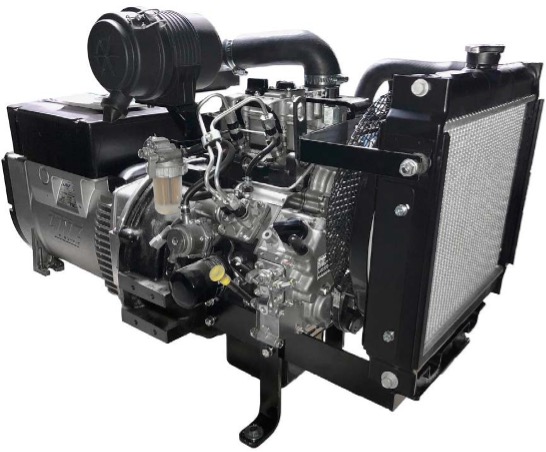
Occidental Area Power Outage Gasoline Availability
This presentation was originally geared towards Occidental residents: for information on where to fuel up in the event of a power outage that specifically impacts Occidental.
Only 4 gas stations near us can provide gas during power outages:
- 76 Station at Occidental Rd. at Hwy. 116
- 76 Station in Guerneville on Main St. across from Safeway
- MD Gas. 16430 Main Street, Guerneville
- 76 Station in Bodega Bay (Hwy. 1 across from Tides restaurant)
The Two Classes of Home Generators
- The Portable Generator
- Gasoline-fueled
- Dual-fueled (gasoline & propane)
- Inverters
- Parallel-linked generators (gasoline or dual fueled)
2. Stationary/Permanent/Standby Generator
- Methane (natural gas) fueled
- Propane fueled
Typical Mid-Power Portable Generator

- Champion Portable
- 7500-Watt
- Electric Start
- 25-ft. Extension Cord
- $833 and free shipping
Gasoline-Fueled Portable Generators
| PROS | CONS |
| Portable Easier to fix than standby generators Gas is 26% more fuel efficient than propane | Must be manually started by either a battery or a recoil start Limited to a maximum of about 17Kw rated/running power Nosier than comparable-sized inverters and standby generators Stale gas issues and associated maintenance As with all portable generators, although they are water resistant, they should be protected from rain |
Typical Mid-Power Dual-Fuel Portable Generator
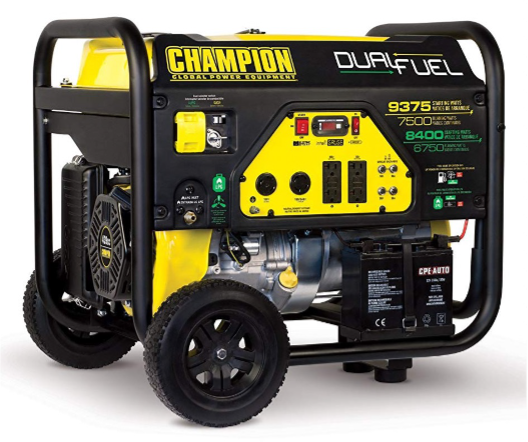
- Champion Dual-fuel portable
- Electric start
- 7500W rated/running
- 9575W peak/surge using gasoline
- 6750W rated/running
- 8400W peak/surge using propane
Duel-Fuel Portable Generators
| PROS | CONS |
| Less expensive than comparable-sized standby generators Portable Easier to fix than standby generators Choice of two fuels No need for a large propane storage tank, can use exchangeable propane Bottles Able to obtain propane during a power outage when gas pumps may not be working….but this is misleading Stale gas issues eliminated if using propane | Cost about $100 to $300 more than its gasoline-only counterpart Must be manually started by either a battery or a recoil start Limited to a maximum of about 12.5 Kw rated/running power Noisier than comparable-sized inverters and standby generators |
Exchangeable Propane Tank Use Considerations – 20 lb. Tank
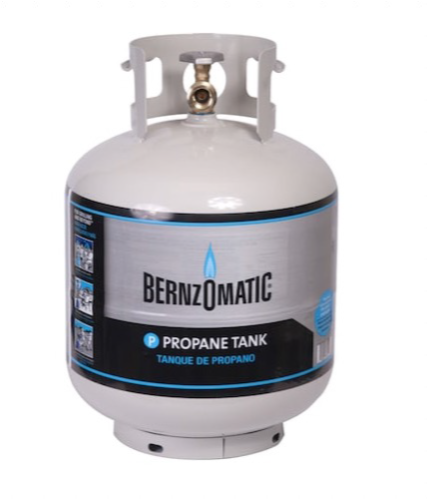
- 20 lb. propane tank stats
- Weight: About 22 lbs. empty/37 lbs. full
- One gallon of liquid propane weighs 4.23 lbs
- A 20 lb. tank of propane therefore contains about 4.7 gallons of LP
- You will only receive 15 lbs. (3.53 gal.) in a tank exchange
How many tanks or refills would you realistically need during a 4-day outage?
Exchanging 5 tanks at once will provide 17.6 gallons of propane which should produce about 30 hours of power—or about 10hrs./day for 3 days. (at a 0.6 gal./hr. consumption rate)
Exchangeable Propane Tank Use Considerations – 40 lb. Tank

- 40-lb. propane tank stats
- Weight: about 73 lbs. full
- Full, this tank contains 40 lbs./9.45 gal. of propane
- Refilling 3 tanks will provide 28.3 gal. of propane
- This should produce about 48+ hours of power—or about 10 hours/day for almost 5 days at the same 0.6 gal/hr. consumption rate
Gasoline and Liquid Propane Storage Restrictions
Gasoline
You are permitted to store up to 5 gallons of gasoline in an approved container in a garage or outbuilding.
OR:
You are permitted to store up to 10 gallons of gasoline in an approved container(s) outside your buildings.
Propane
You are permitted to store up to a total of 70 gallons of liquid propane (300 lbs.) in approved containers in a garage or outbuilding. There are no restrictions on cylinder size.
Outdoor propane storage can be as large as 1,000 gallon tanks (provided proper clearances and safety requirements are met).
Inverter Generators
Modified square wave generator output vs. sine wave inverter output:

A High-Powered Inverter Generator

- Champion 5000W inverter
- Both recoil and electric start
- Intelligauge ® display: Voltage, frequency, and operational hours
- 3-year warranty with lifetime technical support
- 4.8 stars based on 14 reviews
High-Output Inverter Generator

- Honda EU7000IS Inverter
- 5,500W rated/running
- 7,000W peak/surge. 52-60 dBA at 7m
- 4.9 stars (based on over 300 reviews from Northern Tool, Electric Generators Direct, and Amazon)
Inverter Generators
| PROS | CONS |
| More efficient than comparable size gasoline or propane generators Quieter than all comparable size generators Purer sine wave (less THD) than other types of generators Reduced size and weight | More expensive than comparable standard gasoline and propane generators Not available in power outputs above about 5,500W All the issues associated with gasoline still apply: stale gas, flammability, availability, CO poisoning |
Typical Portable 120V Duel-Fuel Inverter Generator Capable of Parallel Hookup

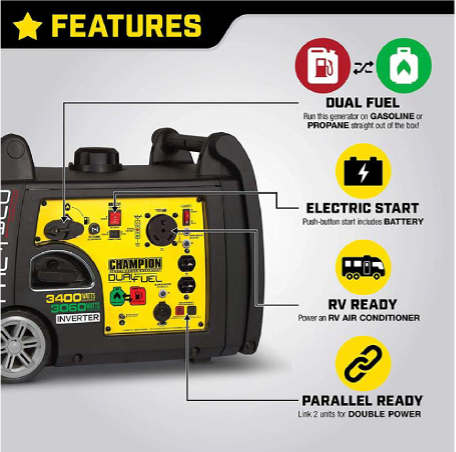
- 120V Champion 3100-W RV Ready Duel- Fuel Generator
- Electric start
- 3100W rated/running
- 3400W Peak/surge/peak
- 59dBA at 23 ft THD<3%95.7 lbs
- Parallel Kit: Uses a “parallel block” to tie two “like” inverters together
- 4.5 Based on 388 reviews
Typical Permanent/Standby LP or NG-Fueled Generator
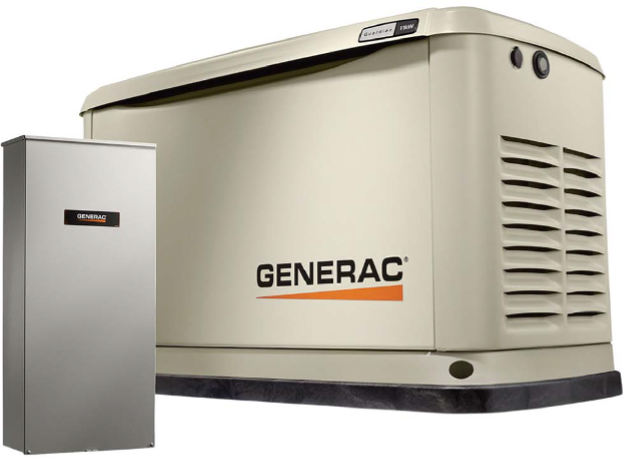
| PROS | CONS |
| Wide range of power options A matched automatic transfer switch is often included in the price and can provide for total hands-off generator operation Somewhat quieter than comparable gas-powered generators Lifespan typically longer than all but diesel generators Propane burns cleaner than gasoline, produces less carbon monoxide than gasoline and does not get stale | Higher cost ($3K to over $12K) than all but diesel generators Propane gas piping is needed to the generator Propane generators are complex and can be harder to fix Not portable On-site repairs and maintenance Fuel can be costly if the unit is run for an entire multiple-day outage |
Typical Standby Generator

- 17Kw Cummins RS17A standby generator
- Includes 200A Automatic transfer switch
- 39L x 36W x 30H. AVR: +/- 1.25% <5% THD
- Remote monitoring possible
Fuel Consumption Comparisons
| RS13A: 13kW $3,200/Costco with 100A automatic transfer switch ¼ load = 1.4 gal. propane/hr. 4.5 days = 108 hrs. = 151 gal. At $3/gal. = $454 or $101/day ½ load = 1.7 gal. propane/hr. = 184 gal. = $551 or $122/day |
| RS17A: 17kW $4,000 Costco with 200A automatic transfer switch ¼ load = 1.5 gal. propane/hr. 4.5 days = 108 hrs. = 162 gal. At $3/gal. = $486 or $108/day ½ load = 1.9 gal. propane/hr. = 205 gal. = $616 or $137/day |
| RS20AC: 20kW $4,500/Costco with 200A automatic transfer switch ¼ load = 1.5 gal. propane/hr. 4.5 days = 108 hrs. = 162 gal. At $3/gal. = $486 or $108/day ½ load = 2.0 gal. propane/hr. = 216 gal. = $648 or $144/day |
13kw/17kW = 0.76 or 76%. The 17kW generator delivers 24% more power than the 13Kw but only consumes about 9% more fuel. 13kW/20kW = 0.65 or 65%. The 20kW generator delivers 35% more power than the 13Kw but only consumes about 15% more
Calculating the Power You Need
To determine your basic home power needs, start with these three questions:
- Do you use city or well water?
- Well pumps require a larger 240 volt generator (rated 3800 watts or above).
- Is your heating system electric, heat pump, or gas forced air?
- Gas forced air systems can get by with a very small generator – as little as 2500 watts.
- The power needed is based on the size of the furnace fan motor.
- Electric furnaces and heat pumps typically need 15,000 watts or more to run and cannot be powered by a portable generator.
- Is your hot water heater electric or gas?
- Gas heaters use less power – as little as 2500 watts.
- Electric heaters often require at least 4500 watts.
Should you opt for a minimal-sized generator?
| PROS | CONS |
| Less fuel consumption per hour Possibly less noise Possibly less maintenance Less cost | Restricts what you can simultaneously power Usually requires active power management Impacts your lifestyle to a higher degree |
What Circuits to Power During a Long Power Outage
This is a matter of personal preference.
Variables to consider:
- Refrigerator/freezer
- Receptacle(s) for any powered medical devices
- Microwave oven (or cook top, if electric)
- Pump (submersible or jet) for your water storage tank (If no storage tank, the well pump should probably be powered)
- At least one extra 120V receptacle (for computer, phone recharging, lamps, etc.)
- Electricity to one bathroom
- Optional: Water heater (tankless or similar)
- Optional: Water heater (tankless or similar)
Part 2 Coming Soon!
That concludes Part 1 of the Residential Generator Seminar – stay tuned for Part 2, which will cover…
- Types of Generator Connections
- Generator Start Up & Shut Down Procedures
- Safety Considerations
- Ways to Minimize Problems and Improve Reliability
- Maintenance Requirements
